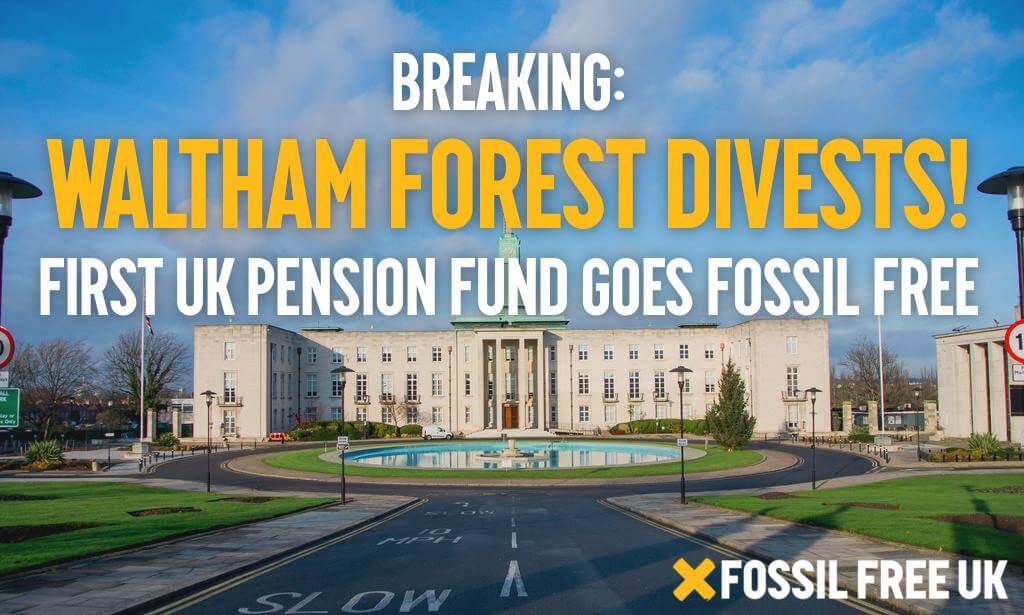Last week the pension fund committee of London Borough of Waltham Forest became the first UK public authority to announce its commitment to go 100% fossil free. The decision to divest was unanimously agreed by both Labour and Tory councillors.
Why is this important?
Exactly a year ago, we published our data, showing that UK local government pension schemes invest over £14 billion in the fossil fuel industry. Since then, three other pension funds have made moves towards divestment. In late 2015 the Environment Agency Pension Fund committed to reduce its coal assets by 90% and its oil and gas stocks by 50% by 2020. South Yorkshire Pension Fund followed suit announcing the fund would divest from coal and tar sands, publically stating that coal is the ‘most polluting’ fossil fuel. In January 2016, London Borough of Haringey, which is seeking to become London’s first zero carbon borough, agreed to divest from coal and invest £200M into a low carbon fund.
But Waltham Forest’s announcement surpasses all these commitments. The Waltham Forest fund – worth £735 million – will be fully divesting all the £23.9 million it currently holds in fossil fuel companies. It demonstrates that it is possible for a public sector pension fund to not just reduce holdings or throw out the dirtiest tar sands stocks, but fully divest from all fossil fuels.
Pension funds have a duty of care – ‘fiduciary duty’ – to pension fund members, which includes preserving a decent world not wrecked by climate change for its members and others to live in. Waltham Forest’s pension fund committee understands the material risks climate change poses and that fiduciary duty requires the committee to manage these risks. Other pension funds are strongly encouraged to follow Waltham Forest’s leadership. Lothian Pension Fund rejected divestment saying it would be too costly. Lothian would benefit from reconsidering its decision in light of Waltham Forest’s announcement. We hope that funds currently considering divestment, like Hackney Pension Fund, take encouragement from Waltham Forest’s decision.
Where does the money go?
Local authorities, as our civic institutions, can lead the just low carbon transition – including by investing in sustainable energy, transport, and housing. Councilor Simon Miller, chair of Waltham Forest’s pension fund committee says of the announcement,
“Not only does this mean that the fund will not be invested in stranded assets, but will be actively investing in cleaner, greener investments to the benefit of our community, borough and environment.”
What now?
A recent report by Oil Change International (with 350.org, the Indigenous Environmental Network and others) finds that the potential carbon emissions from the oil, gas, and coal in the world’s currently operating fields and mines would take us beyond 2°C of warming. As Bill Mckibben says, the numbers from the study spell out, in simple arithmetic, how much of the fossil fuel in the world’s existing coal mines and oil wells we can burn if we want to prevent global warming from cooking the planet. And the answer is zero.
This means that existing fossil fuel infrastructure needs to be urgently decommissioned. Like other institutions committed to divestment, Waltham Forest Council has put itself on a 5-year timeline to divest from fossil fuels. But the transition needs to be much more urgent than that. We urge Waltham Forest to build on its leadership and fulfil its fossil fuel divestment commitment sooner rather than later, and use divested funds to hasten a just transition to a zero carbon world.
What you can do
This is a great victory but it is only the beginning. We need to build on the space for change created by Waltham Forest’s historic announcement. You can also get involved in pushing more councils to divest. What are your local council’s pensions invested in? You can use the data release to look it up. The time is ripe to join your local divestment campaign. And if there isn’t one local to you, you can start one!
Let’s keep the victories coming!
